University of Graz
The Particle Lab (PaLab) was established in 2018 and is a decentralized laboratory for the production and characterization of nanostructured as well as particulate (bio)materials. These substances have gained increasing importance worldwide in the technical and materials science fields, but also in the medical, pharmaceutical fields. For example, nanoparticles of metals such as silver and gold are now used for many applications in technology but also for consumer products in the home, as well as in medicine and pharmacy as drug carriers. Very topical are vaccines that protect mRNA from degradation in the form of nanoparticles and thus make it possible to ensure very specific immune reactions after application in our body.
The PaLab is financed as a joint project between the Karl Franzens University Graz (KFU), the Medical University Graz (MUG) and Anton Paar GmbH Graz. In the first phase, the lab was financed by Hochschulraumstrukturmittel (HRSM) and subsequently by infrastructure funds of KFU. KFU (Prof. Zimmer) was in charge of the application for funding via HRSM.
The fabrication and characterization capabilities offered by PaLab include microfluidic systems (e.g. Nanoassemblr) and imaging techniques combining classical light microscopy techniques with high-resolution atomic force microscopy (AFM), scattered light techniques such as laser diffraction, dynamic light scattering and particle tracking, particle counting techniques using microscopy and laserobscuration, and multi-angle light scattering techniques in combination with size exclusion chromatography for substance separation and molecular weight determination (MALLS). Further descriptions of the infrastructure can be found here.
The PaLab is located as a decentralized laboratory facility in rooms of the KFU and the MUG and is also available to all external researchers as well as companies for contract analysis. Please direct inquiries to us by e-mail.
The MUG, Institute of Biophysics (Prof. Prassl), has been working for many years on large biomolecules and particles of lipid metabolism, such as lipoproteins, HDL/LDL, etc. Liposomes are developed as drug carriers or for imaging diagnostics. MUG participates in the PaLab with a NanoAssemblr (Microfluidics). The products made with it can then be further investigated with other instruments of the PaLab Graz. In addition, MUG has a nanoparticle tracking system based on light scattering that can be used to measure the diffusion velocity of nanoparticles or self-assembled products. In development is a new technology, also based on light absorption, which can be used to separate and sort particles.
Anton Paar is one of the leading international manufacturers of scientific instruments used for the physical characterization of substances, substance mixtures and substances for the food and pharmaceutical industry e.g. density, flow behavior etc. Anton Paar as an industrial company supports PaLab Graz with a novel light scattering system (Litesizer). This instrument allows the characterization of particle size and size distribution over a wide measuring range from approx. 1 nm to approx. 10 µm. At the same time, the zeta potential of the material can be determined.
Nanosurf AG, Liestal, Switzerland
Precision Nanosystems, Vancouver, Canada
Malvern Instruments, Herrenberg, Germany
Anton Paar, Graz, Austria
Anton Paar, Graz, Austria
Wyatt Technology, California, USA
Agilent, California, USA
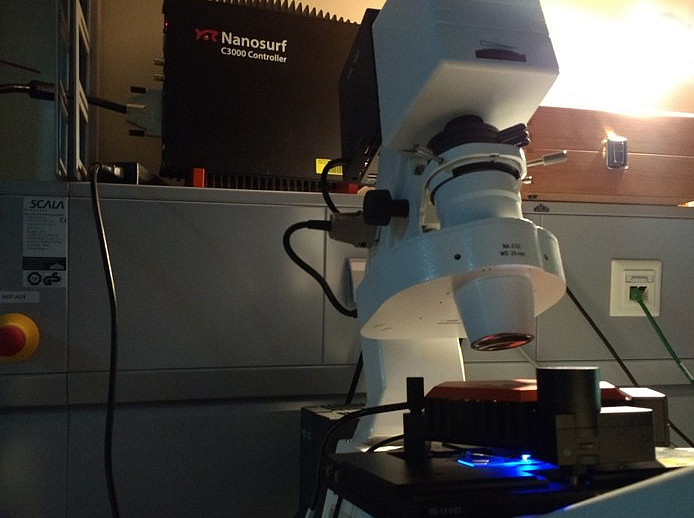
NanoSurf AFM 5 (Atomic Force Microscope)
Nanosurf AG, Liestal, Switzerland
The Nanosurf FlexAFM 5 is considered the most versatile atomic force microscope in the fields of research and science. The flexible, electro-magnetic scanner ensures measurement of high and linear motion in the X and Y planes. In addition, a low-noise, high-speed 4-quadrant photodetector achieves high-resolution spectroscopic images. Optimal sample analysis and cantilever control can be ensured by the FlexAF top and side views.
- Measurements of liquid and gaseous substances
- Versatile application possibilities and measurement methods
- Compatible with inverted microscopes
NanoAssemblr® Benchtop Instrument
Precision Nanosystems, Vancouver, Canada
NanoAssemblr® enables the production of drug-loaded nanoparticles under controlled conditions using microfluidics.
- Nanoparticle synthesis: Fast and controlled production of nano-pharmaceuticals by laminar mixing of two flows in a dedicated microfluidic mixing chamber.
- Controlled synthesis: the size of nanoparticles can be controlled by precisely adjusting the flow rates. The total flow rate, as well as the mixing ratio, are adjusted accordingly. Additional variability exists in the choice of solvent and concentration of substances.
- Versatility: Small molecules, peptides or nucleic acids can be formulated with lipids, polymers or hybrid nanoparticles.
- Reproducibility: Computer-controlled single-step synthesis guarantees high batch-to-batch reproducibility.
- Scalability: Easily scalable between 1mL to 15 mL / min. Fast and efficient production of pharmaceutical nanoparticles within minutes.
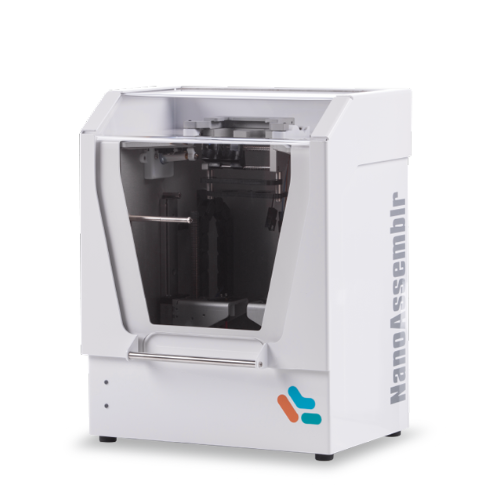
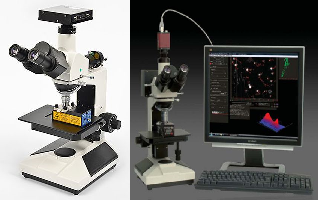
NanoSight LM10 Instrument
Malvern Instruments, Herrenberg, Germany
The NanoSight LM10 uses nanoparticle tracking analysis (NTA) to characterize nanoparticles from 10-1000 nm in diameter in solution. Each particle is observed individually and many particles are observed simultaneously and their diffusion behavior is recorded. Both particle size and concentration (number of particles in solution) are measured. A fluorescence mode allows differentiation of fluorescently labeled nanoparticles.
Litesizer 500 - Particle Size Analyzer
Anton Paar, Graz, Austria
The Litesizer 500 is an instrument for characterizing nano- and microparticles in dispersions and solutions. It determines particle size, zeta potential and molecular mass by measuring using dynamic light scattering (DLS), electrophoretic light scattering (ELS) and static light scattering (SLS).
In addition, the Litesizer 500 is the only DLS-based particle analyzer that can measure sample refractive index without detours.
A highlight of the Litesizer 500 is its ingeniously simple software. We have developed a one-page workflow that combines parameters, results and analyses on a single page. So you can set up your measurements in just a few seconds and get the analysis results and reports you need at the touch of a button.
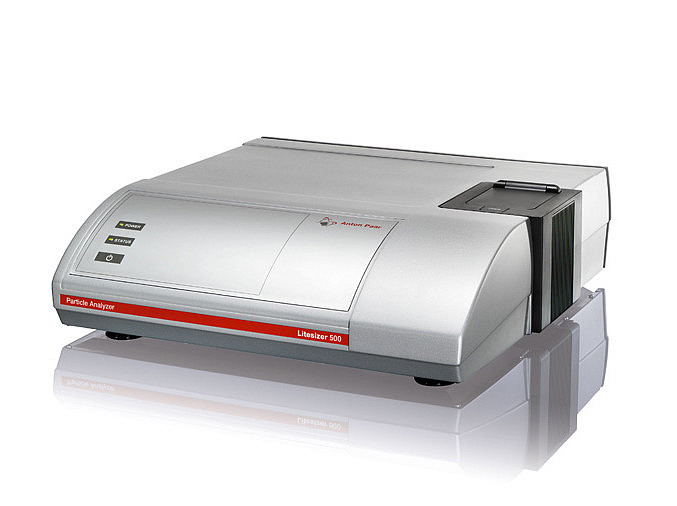
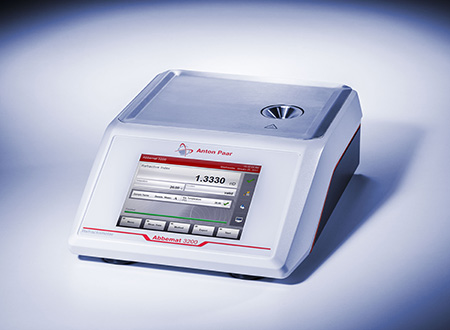
Refractometer Abbemat 3000
Anton Paar, Graz, Austria
For concentration and refractive index measurement of liquids and pastes; the Abbemat 3X00 refractometers stand for reliability, precision and ease of use. These laboratory refractometers offer you an exceptional combination of technical expertise and uncomplicated operation. They are insensitive to environmental influences and require minimal cleaning and no extensive maintenance. Thanks to premium technology and the compact design of the Abbemat 3X00 refractometers, time-consuming measurements are turned into highly efficient quality control. Three models are available to suit your application and budget.
- For routine analysis of sugar and beverages
- Available sugar scales, e.g. Brix, sucrose, HFCS scales
- Temperature-corrected measurement results within 4 seconds
miniDAWN for "Size Exclusion Chromatography"
Wyatt Technology, California, USA
Best macromolecular analysis by multi-angle light scattering.
Molar mass
The miniDAWN ® determines absolute molar mass and size for characterization of proteins, peptides, small polymers and dissolved nanoparticles. When used in conjunction with Size Exclusion Chromatography (SEC or GPC), it eliminates inaccuracies and the additional expense of column calibration. It thus ensures accurate data in macromolecular characterization.
Outstanding sensitivity
The miniDAWN not only offers outstanding sensitivity - it also increases productivity thanks to greatly improved field serviceability and easy data analysis with One-Click Mw ™.
Compatibility with ASTRA®
The miniDAWN is powered by ASTRA, a versatile software package that can perform both online multi-angle and dynamic light scatter measurements. ASTRA® and the miniDAWN have advanced and user-friendly features that guarantee excellent one-click measurements.
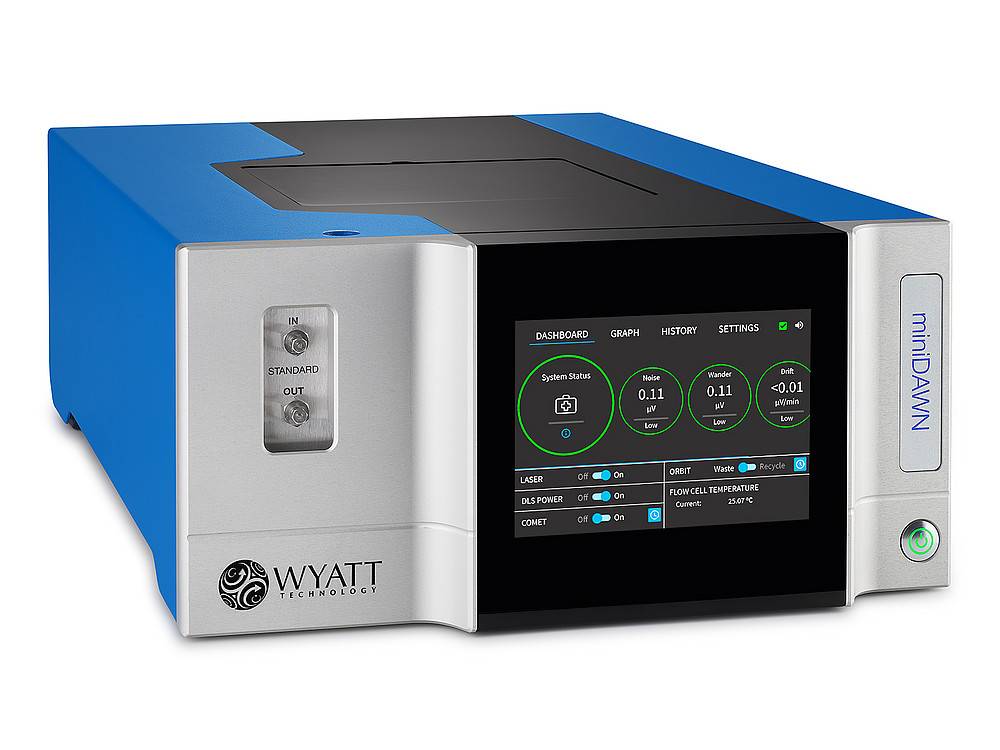
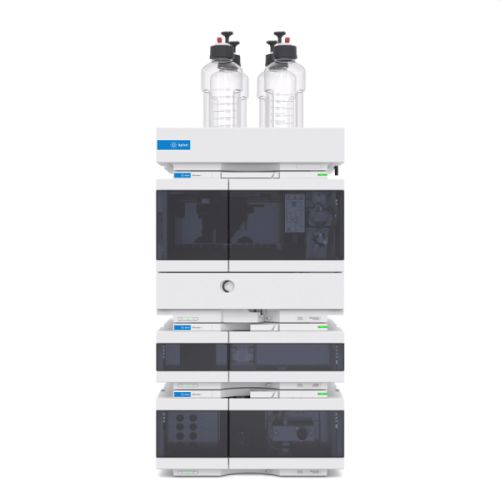
1260 Infinity II LC System for "Size Exclusion Chromatography"
Agilent, California, USA
The 1260 Infinity II LC system is a rugged HPLC that offers the widest selection of powerful, reliable, and robust modules for entry-level analytical HPLC and UHPLC.
The 1260 Infinity II LC delivers robust HPLC results while offering numerous user-friendly features that make it the standard system for routine analysis. It builds on the history of the 1100 and 1200 Series analytical HPLC. Combine new modules with existing instruments to maximize uptime and minimize interruptions.
